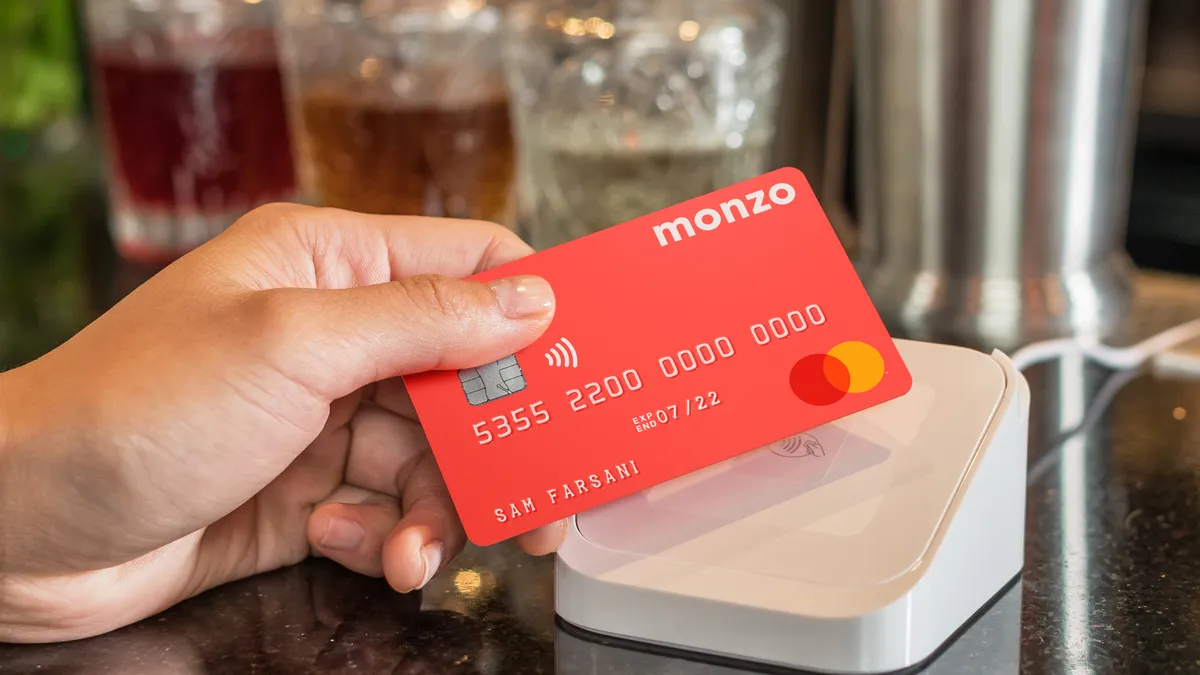Dive Brief:
- British challenger bank Monzo has withdrawn its application for a U.S. banking license after it became clear the Office of the Comptroller of the Currency (OCC) likely would not approve it, the Financial Times reported Monday.
- "There are many routes to market we’re exploring that have been successful for other market entrants who are now major players," the company told Reuters in a statement.
- While the withdrawal is a roadblock, it’s not necessarily a dead end. Varo, which, in July 2020 became the first challenger bank to receive a national banking charter from the OCC, withdrew an application with the Federal Deposit Insurance Corp. (FDIC) in 2018. Square, which filed for an industrial loan company (ILC) charter with the FDIC in September 2017, withdrew that application in July 2018 before refiling and being approved in March 2020. Square’s banking arm launched a year later.
Dive Insight:
Monzo, which counts 5.5 million customers, hardly sees its application withdrawal as an end. Indeed, the web page for the challenger bank’s U.S. offering still includes a call to action to join its waitlist.
Monzo acknowledged, in a statement to CNBC, that "this isn’t the outcome we initially set out to achieve, [but it] allows us to build and scale our early-stage product offer in the U.S. through existing partners."
One of those partners, Ohio-based Sutton Bank, is helping Monzo run a pilot program among a few thousand customers, according to the Financial Times.
An "active debate" had rumbled for months within the company over whether the move to become a fully licensed bank in the U.S. was the best path forward, a person close to Monzo told the publication.
Varo’s pursuit of a license, for example, cost the bank nearly $100 million over three years. By not continuing to pour money into a U.S. licensing effort, Monzo intends to "invest further in the U.K.," the company said.
Monzo — which began its U.S. licensing odyssey in April 2020 after launching its app stateside a year earlier — reported £130 million in losses last year, and took a £114 million loss in 2019, according to CNBC. The results prompted accounting giant EY to express concern that the challenger bank may not be able to stay afloat, according to the Financial Times. The company saw a 40% drop in valuation around the start of the COVID-19 pandemic, and it disclosed in July that it is facing a potential money laundering probe from the Financial Conduct Authority.
It is also, however, forging ahead with new revenue streams such as a buy-now-pay-later effort it launched in the U.K. last month.
Monzo hasn’t been the only U.K. challenger to try for a U.S. license. Revolut applied for one in March. The scenario plays in reverse, too. U.S. banking giant JPMorgan Chase launched a digital-only bank in Britain last month.
Several other companies with banking aspirations have applied for U.S. licenses only to withdraw and recalibrate. San Francisco-based fintech Brex withdrew its ILC and deposit insurance applications in August. Japanese e-commerce giant Rakuten pulled its deposit insurance application for the second time in August 2020. And stock-trading app Robinhood withdrew its application with the OCC in December 2019.













